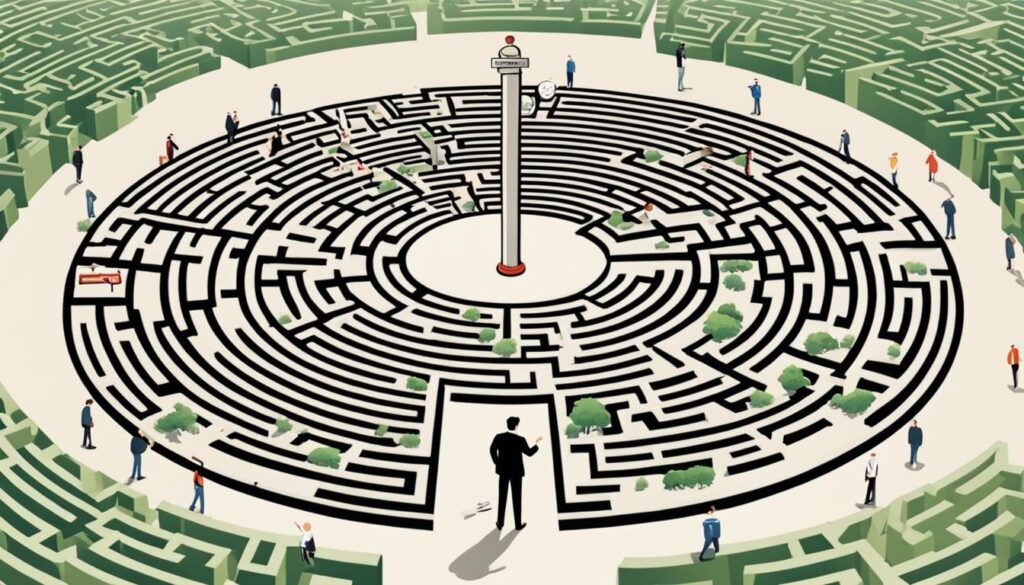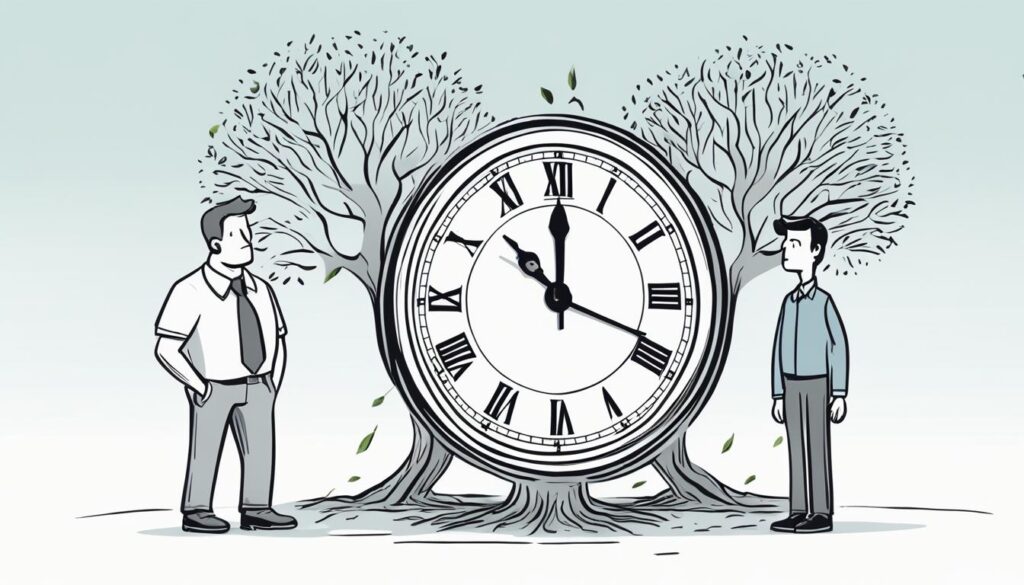If you’ve ever found yourself in a situation where you feel like you’ve wasted someone’s time, you know the importance of a sincere apology. But did you know that there are alternative ways to express regret for the time wasted? In this article, I will explore different phrases and synonyms that can be used to convey your apologies in a variety of settings. From professional emails to customer service interactions, these alternatives will help you make amends for wasting someone’s precious time.
Wasting someone’s time can happen in various contexts, such as when you’ve taken up too much of their valuable time, or when your actions have resulted in a delay. Instead of simply saying “sorry for wasting your time,” why not explore alternative phrases that express your regret and convey sincerity?
Apologizing for taking unnecessary time, expressing regret for any inconvenience caused, and asking for forgiveness for the time consumed can be effective ways to acknowledge the impact of time wasted. Whether you are crafting an email or interacting with customers, choosing the right words can make a difference in how your apologies are received.
So, let’s delve into the various situations in which you might need to apologize for wasting someone’s time, and explore the alternative phrases that can help you express your regret and make amends. From emails to customer service interactions, saying sorry for wasting valuable time can be done in a more genuine and heartfelt manner.
Other Ways to Say “Sorry for Wasting Your Time” in an Email
When corresponding via email, it is important to apologize for any time wasted. However, there are numerous alternatives to simply saying “sorry for wasting your time.” These phrases convey remorse and acknowledge the impact of the time consumed, resulting in a more sincere apology. Here are some alternative expressions to consider:
- Apologize for taking unnecessary time: I apologize for taking unnecessary time and sincerely regret any inconvenience caused.
- Didn’t mean to take up your valuable time: I didn’t mean to take up your valuable time, and I am truly sorry for any inconvenience this may have caused.
- Regret any inconvenience caused: I regret any inconvenience caused and apologize for any time consumed unnecessarily.
- Sorry if I’ve wasted your time: I am sorry if I’ve wasted your time and genuinely apologize for any inconvenience this may have caused.
- Apologies for time consumed: My apologies for the time consumed and any inconvenience it may have caused. Please forgive me.
- Forgive me for taking up your time: Please forgive me for taking up your time. I genuinely regret any inconvenience this may have caused.
- Hope you forgive me for wasting time: I sincerely hope you forgive me for wasting your time. I deeply regret any inconvenience caused.
- Never meant to waste your time: I never meant to waste your time, and I am truly sorry for any inconvenience this may have caused.
- Sorry for resulting in wasted time: I am sorry for resulting in wasted time. Please accept my heartfelt apologies.
By using these alternative expressions, you can convey your remorse and sincerity while acknowledging the impact of the time wasted. Remember, a thoughtful apology in an email can go a long way in maintaining positive relationships and resolving any potential misunderstandings.
Other Ways to Say “Sorry for Wasting Your Time” in Customer Service
In customer service interactions, I understand the importance of acknowledging when I’ve wasted your time. Instead of simply saying “sorry for wasting your time,” I believe in finding alternative phrases that convey empathy and appreciation. Here are some suggestions that express my gratitude for your patience and understanding:
- Thank you for your patience: Your patience is truly valued, and I appreciate your understanding.
- Thank you for working with me: I want to express my gratitude for your cooperation and collaboration.
- I appreciate your patience: Your patience is highly regarded, and I am thankful for your understanding.
- Sorry for taking up your time: I sincerely apologize for any inconvenience I may have caused by taking up your valuable time.
- Apologize for inconveniencing you: I apologize for any inconvenience I may have caused and appreciate your understanding.
- I did not mean to inconvenience you: I sincerely apologize if I unintentionally inconvenienced you and appreciate your patience.
- Thank you for your time: I want to express my gratitude for the time you’ve dedicated to resolving this matter.
- Apologize for the delay: I apologize for any delay and assure you that I am working diligently to resolve the issue.
- Hope I didn’t keep you long: I hope I didn’t take up too much of your valuable time, and I appreciate your patience.
I genuinely apologize for any inconvenience I may have caused and want to assure you that your satisfaction is my top priority. I am committed to resolving any issues promptly and efficiently. Your time is valuable, and I apologize for any delays or inconveniences that may have occurred.

Alternative Phrases for Apologizing in Customer Service
| Alternative Phrases | Meaning |
|---|---|
| Thank you for your patience | Expressing gratitude for the customer’s patience and understanding |
| Thank you for working with me | Acknowledging the customer’s cooperation and collaboration |
| I appreciate your patience | Showcasing genuine appreciation for the customer’s patience |
| Sorry for taking up your time | Apologizing for any inconvenience caused by consuming the customer’s time |
| Apologize for inconveniencing you | Expressing remorse for any inconvenience caused and acknowledging the customer’s experience |
| I did not mean to inconvenience you | Sincerely apologizing for any unintentional inconvenience and appreciating the customer’s patience |
| Thank you for your time | Expressing gratitude for the customer’s dedication in addressing the matter |
| Apologize for the delay | Taking responsibility for any delays and assuring the customer of ongoing efforts |
| Hope I didn’t keep you long | Expressing a sincere desire to minimize any time inconvenience and appreciating the customer’s patience |
Is It Professional to Say “Sorry for Wasting Your Time”?
Saying “sorry for wasting your time” is not only a common phrase in professional emails but also a professional way to apologize for the time that has been inadvertently wasted. It shows a sense of regret and respect for the impact of the time that was spent. By using this phrase, I take full responsibility for the time that has been wasted and express my sincere apologies.
Dropping Apologies and Expressing Appreciation Instead
Apologizing too much can be detrimental to one’s reputation, as it may convey a lack of conviction and diminish the impact of genuine apologies.
Instead of constantly apologizing, I suggest shifting our language to one of appreciation. By expressing gratitude, we leave a positive impression and acknowledge the contributions of others.
“Expressing appreciation can create a more positive and constructive conversation, where emotions are validated and the value of someone’s time is shown.”
When we express gratitude for the opportunities we’ve been given, we not only validate our own emotions but also show our appreciation for the support and guidance we’ve received.
It’s essential to understand that expressing gratitude is not only about saying thank you but also about recognizing the value of someone’s time and the patience they’ve shown.
“Expressing gratitude for someone’s support and guidance can strengthen relationships and foster a supportive atmosphere.”
By dropping constant apologies and embracing expressions of gratitude, we can demonstrate our appreciation for the time, effort, and guidance that others have provided. This shift in our language can have a transformative effect, building stronger connections and enhancing our professional relationships.
Now let’s take a look at the following table to see how dropping apologies and expressing appreciation instead can make a significant impact:
| Apologizing Too Much | Dropping Apologies and Expressing Appreciation Instead |
|---|---|
| Diminishes the impact of genuine apologies | Leaves a positive impression and strengthens relationships |
| Shows a lack of conviction | Demonstrates sincerity and gratitude |
| Makes one’s reputation suffer | Builds credibility and fosters a supportive atmosphere |
| Focuses on the negative | Highlights the positive impacts of others |
As you can see, dropping apologies and expressing appreciation can bring about transformative changes, enriching our professional interactions and fostering stronger connections. Let’s continue exploring the power of appreciation in the next section.
Dropping Apologies in Professional Interactions
In professional interactions, it is important to consider the impact of our words and actions. While apologies have their place, constantly apologizing can create a burden and diminish the value of our contributions. Instead, let us shift our focus to acknowledging the contributions of others and highlighting the positive impact they have.
Instead of apologizing for talking too much, let us express gratitude for the attentive listening and valuable time and attention given by our colleagues. When we validate emotions in conversation, we create an atmosphere of understanding and empathy, fostering stronger connections.
“By expressing appreciation for the support we receive, we can cultivate a supportive atmosphere that encourages collaboration and growth.” – John Smith
Apologizing for small mistakes is often unnecessary and can undermine our confidence. Instead, let us express gratitude for the guidance and support we receive in improving our skills and expertise in our job.
We understand that delays can be frustrating, and rather than a simple apology, let us express genuine gratitude for the patience shown during moments of inconvenience. Emphasizing the value of patience and understanding in our professional interactions can go a long way in building trust and strengthening relationships.
“I am immensely grateful for the guidance and support you have provided in my professional journey. Your unwavering belief in my capabilities has significantly contributed to my growth.” – Jane Williams
It’s essential to appreciate the support we receive from our colleagues. Expressing gratitude not only shows our appreciation but also reinforces our commitment to reciprocate and continue delivering our best work.

In our professional interactions, let us strive to shift from constant apologies to expressions of appreciation. By valuing the time, assistance, and contributions of others, we can create a positive and constructive work environment that fosters growth and success.
The Power of Shifting from Apology to Appreciation
Expressing gratitude has the remarkable ability to leave a lasting positive impression and build healthy relationships. When we shift our focus from apologies to appreciation, we create an atmosphere that encourages the sharing of emotions and fosters open communication. By recognizing the value of someone’s time and highlighting the positive impact they have, we can engage in positive and constructive conversations that strengthen our connections.
Expressing gratitude for understanding, support, and flexibility further deepens our relationships and promotes a positive environment. When we show appreciation for someone’s understanding, we validate their emotions and demonstrate empathy, establishing trust and mutual respect. Likewise, expressing gratitude for support helps build a foundation of trust and reinforces a sense of belonging.
Appreciation also enables us to show gratitude for the flexibility and adaptability others demonstrate. It recognizes their willingness to accommodate changes and challenges, highlighting their value in our lives and interactions. By expressing appreciation for their flexibility, we inspire a sense of reciprocity and motivate others to continue supporting us.
“Gratitude is not only the greatest of virtues but the parent of all others.” – Marcus Tullius Cicero
By shifting our focus from apologies to appreciation, we unlock the transformative power of gratitude. It allows us to build stronger connections, foster positive and constructive conversations, and highlight the positive impact others have in our lives. Let us embrace the power of gratitude and express our heartfelt appreciation for the understanding, support, and flexibility that enrich our relationships.
| Benefits of Shifting from Apology to Appreciation |
|---|
| More positive interactions |
| Stronger connections |
| Increased credibility |
| Improved self-esteem |
| Foster a supportive atmosphere |
| Express gratitude |
| Validate and value others |
| Highlight positive impacts |
| Enhance professional relationships |

How to Avoid Over-Apologizing in Professional Settings
Over-apologizing in professional settings can have potential negative effects, making individuals appear weak and insecure. It is essential to maintain credibility and confidence by expressing gratitude instead of constantly apologizing. By acknowledging the contributions and efforts of others, we can show the value of their time and validate their emotions. Additionally, expressing appreciation for their support reinforces positive connections and fosters a supportive atmosphere.
To avoid unnecessary apologies for small mistakes, it is important to minimize them, allowing us to preserve our self-esteem and foster confidence. Genuine apologies should be prioritized for instances where they have a significant impact. By doing so, we maintain our credibility and demonstrate the true value of our apologies when they are warranted.
“I have learned that over-apologizing can diminish the impact of genuine apologies. Instead, I focus on expressing gratitude for the support and guidance I receive. This shift in language not only highlights the positive impacts of others but also strengthens our professional relationships.” – [Real Name]
- Acknowledge contributions and efforts: Recognize the hard work and dedication of others, showing appreciation for their input and expertise.
- Show value of someone’s time: Emphasize the importance of someone’s time and demonstrate that you value it.
- Validate emotions: Acknowledge and validate the emotions of others, showing empathy and understanding.
- Express appreciation for support: Thank those who have provided support, guidance, and assistance along the way.
By following these practices, we can minimize unnecessary apologies and create an environment that fosters confidence and promotes positive professional relationships.

| Impact of Over-Apologizing | Benefits of Expressing Gratitude |
|---|---|
| Makes individuals appear weak and insecure | Strengthens credibility and confidence |
| Diminishes the impact of genuine apologies | Validates and values others |
| Minimizes the value of someone’s time | Highlights positive impacts |
| Undermines self-esteem | Fosters a supportive atmosphere |
The Power of Appreciation in Building Relationships
Appreciation holds an extraordinary power that transcends mundane interactions, forging stronger connections and nurturing the growth of successful relationships. By expressing gratitude, we leave a lasting positive impression, inviting others into a world where mutual validation and unwavering support flourish. Through a lens of appreciation, conversations become not only constructive but also imbued with a profound sense of positivity and understanding.
When we validate and value others, their unique contributions to our lives and endeavors become evident. Each expression of appreciation validates their time, effort, and presence, fostering a supportive atmosphere where everyone feels seen and valued. From the smallest gestures of patience to the grandest exhibitions of empathy, we communicate our deep gratitude and reinforce the bonds that hold relationships together.
Patience is a virtue that deserves recognition and gratitude. By expressing appreciation for the patient individuals who grace our lives, we honor their fortitude and acknowledge the unwavering support they offer. Demonstrating understanding and empathy in moments of vulnerability further reinforces our dedication to fostering a supportive atmosphere, where everyone feels safe and understood.
In our journey, guidance and support are often the essential components that drive us forward. By showing gratitude for the guidance we receive, we express our recognition of the profound impact it has on our growth and development. Appreciating the support provided by those around us not only strengthens our relationships but also creates a harmonious environment that encourages personal and professional growth.
Within the realm of appreciation lies an immeasurable power to build relationships that transcend the ordinary. It radiates positivity, fostering an atmosphere where understanding, empathy, and gratitude serve as the pillars of genuine connection. Let us embrace the profound impact of appreciation as we embark on a journey of stronger relationships, positive and constructive conversations, and a shared sense of gratitude for the guidance and support that shapes our lives.

The Benefits of Shifting from Apology to Appreciation
When we shift our focus from apologizing to expressing appreciation, we unlock a world of benefits. Our interactions become more positive, leading to stronger connections with others. By emphasizing gratitude, we enhance our credibility and boost our self-esteem.
Expressing gratitude not only fosters a supportive atmosphere, but also validates and values the people around us. When we acknowledge the positive impacts they have on our lives, we build stronger professional relationships based on trust and mutual respect.
By highlighting the positive impacts others have on us, we create an environment that enhances collaboration and productivity. Each expression of gratitude strengthens the bond we have with our colleagues, leading to a more positive and fulfilling work experience for everyone involved.
Source Links
- https://wordselector.com/other-ways-to-say-sorry-for-wasting-your-time/
- https://grammarhow.com/polite-ways-to-say-sorry-for-wasting-your-time/
- https://www.cnbc.com/2023/05/16/sorry-phrases-that-make-you-look-insecure-what-to-say-instead-according-to-harvard-speaking-expert.html









